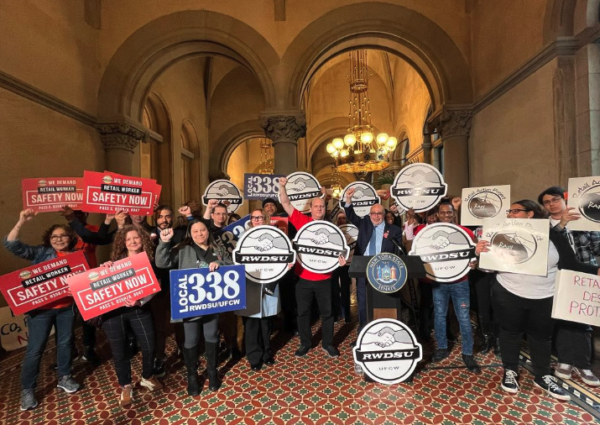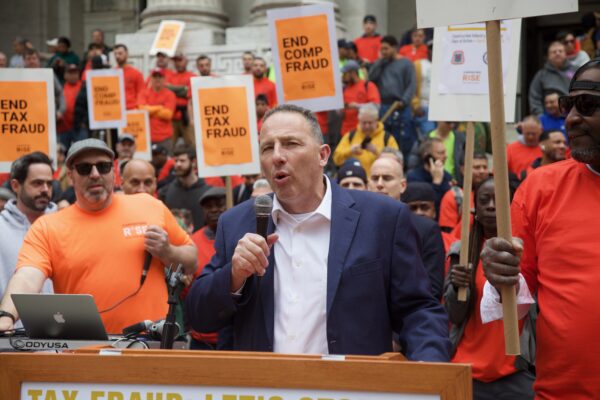New York, NY – “Defund the Police” has become a rallying cry among protestors who want to see police precincts demilitarized and defunded with part of their budgets going towards community programs or services following the killing of George Floyd in Minnesota on Memorial Day.
Floyd’s killing has not only led to demonstrators demanding police reformations, it has also led to many communities wondering how much of their tax dollars are going to police precincts as oppose to community and social programs that could uplift people who are struggling.

As the mayor proposes cuts to art programs, afterschool programs, the education department, youth employment initiatives and professional development programs for the city’s July 1 budget — many New Yorkers are left scratching their heads as to why the NYPD was left virtually untouched in comparison.
Ralph Palladino, the second vice president of District Council 37’s Local 1549, a union that represents clerical and administrative aides, has suggested – along with other elected officials – that the city could save money through the civilianization of the NYPD’s police aides and reallocating funds to the aforementioned social and community programs.
Civilianization would bring able-bodied officers back to the streets and take them off desk duties by replacing them with civilians for the desk roles, which would cost the city less money, according to Palladino. The cost to have officers doing administrative work is $30 million annually.
“Over the last three years the city lost $90 million and it’s a shame because it could sure use that money,” said Palladino. “As a taxpayer, I feel pissed off and if I was on the civil service list I would be equally pissed off.”
There are an estimated 500 able-bodied police officers, traffic agents and school safety officers getting paid the same rate as those on the field doing desk duty, according to Palladino.
At the same time, there are civil service applicants who have spent on average $50 or more on applications for those types of jobs, many of whom are women of color that could use the work, that are from the communities that have been heavily policed and could help diversify the police departments in their neighborhoods, added Palladino.
“They are doing routine clerical work, greeting people as they come in, answering phone calls, gathering paperwork need for cases and filing,” said Palladino. “Civilianization would have more police officers on the street. Prior to the pandemic and the protests, there was an uptick in crime, if we had more officers patrolling wouldn’t that have helped to prevent more crime.”
School safety officers are being misused in handling clerical work at schools, and if there were more traffic agents on the road, perhaps there would be less gridlocks and car accidents that would enhance both public safety and health, according to Palladino.
Brooklyn Borough President Eric Adams, a mayoral candidate for 2021 and former NYPD cop, has went even further by suggesting that commanding officers don’t necessarily need to be police officers and should be picked by the communities they are commanding during a NY1 interview.
“Defunding is not dismantling, defunding means taking a budget that over the last four years, which I think there was a 20-percent increase where almost $1 billion went into policing,” said Adams during the interview. “That money could be used in a more effective way just funding [a community’s] future.”
One example of where funding could also go was Fair Futures, a program that provides mentors for youths and young adults that age out of the foster care system to keep them out of the criminal system, according to Adams.
Palladino has no problem with injured or pregnant officers being on office duty, but doesn’t think that other able-bodied officers should take up the city’s resources.
“We believe in police reform, we believe in judicial reform,” said Palladino. “We don’t have a problem any individual officers, and believe some are good, but we believe in social services, and we would prefer community policing similar to what happened in Camden, New Jersey.”
In 2012, the police precinct in Camden was completely disbanded due to rampant corruption and was replaced with a reformed department that emphasized de-escalation tactics instead of violence, they made sure the department reflected the neighborhood and made new recruits introduce themselves to the people they served, resulting in a 42% reduction in crime over the course of the last seven years, according to a CNN report.
CNN did note that while disbanding and replacing a police department in Camden was feasible, the report did take into account that the New Jersey town was 17% the size of Minneapolis, the city where Floyd was killed, and was far more diverse than the Minnesota town, which is predominantly white, but it could still use the remaining tactics for restructuring.
“So we believe in community policing without the needless violence, SNAP, and Medicaid reimbursement,” said Palladino.
Palladino believes that some of those funds could also go towards 911 operators, especially as they are gearing up to not just answering emergency phone calls, but also taking text messages.
Members of 311 have also been hard to retain because of poor wages, added Palladino.
“The city would also save on overtime as well because the $30 million annually is just wages and benefits, that doesn’t cover the overtime and the other savings that haven’t been calculated for the expenses that we don’t know about,” said Palladino. “Some of that money could go towards 911 operators and upgrading the 311 call center positions. There is a problem of retention in both areas.”
The EMS calls, fire department calls and emergent NYPD calls have to go through 911, which is stressful, according to Palladino.
“I support some of the funds going to these operators, but it should definitely go to the communities where the people are protesting that need it,” said Palladino. “Some of these police officers don’t even live in the city they are policing.”



